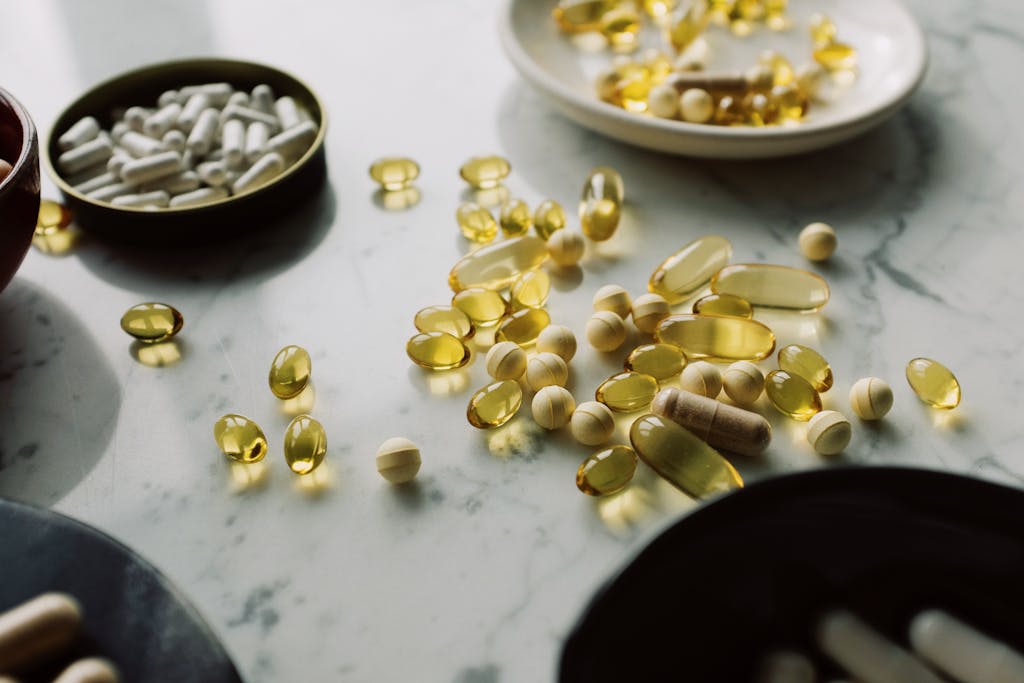FREE SHIPPING OVER $50
Big Beauty’s Dirty Secret: The Skincare Vitamin Linked to Liver Failure
You’d think grabbing a bottle of hair, skin, and nail vitamins from the drugstore would be harmless. After all, it’s sold right alongside multivitamins and labeled with words like “glow,” “radiance,” and “beauty from within.” But behind that shiny promise lies a disturbing truth: some of these “beauty boosters” could be putting your liver at serious risk.
It sounds dramatic—until you hear what happened to Jenny Ramirez.

Jenny’s Story: When Beauty Supplements Backfire
Jenny Ramirez started taking a supplement for her thinning hair. Like many people, she assumed a popular over-the-counter vitamin blend was a safe choice. But within weeks, she noticed the whites of her eyes and her skin turning yellow—a classic warning sign of jaundice, a symptom of liver dysfunction.
At first, doctors were stumped. They ruled out hepatitis and other obvious causes. Only after digging into her lifestyle changes did they realize the likely culprit: her beauty supplement.
The supplement contained MSM (methylsulfonylmethane), a sulfur-based compound marketed for joint health and glowing skin. Though MSM is commonly used in beauty products and supplements, Jenny’s case suggests a serious side effect that’s not widely discussed: acute liver injury.
What Is MSM—and Why Is It in Beauty Supplements?
MSM (methylsulfonylmethane) is a naturally occurring compound found in plants and animals. It’s often added to hair, skin, and nail supplements for its anti-inflammatory and collagen-boosting benefits.
Here’s why manufacturers love it:
- It’s cheap to produce
- It’s generally regarded as safe (when used in small amounts)
- It’s linked to improved skin health and reduced joint pain
Sounds good, right? But here’s the issue: while some studies show MSM has potential benefits, it hasn’t been thoroughly tested for long-term safety, especially when used daily in combination with other supplements or medications.
And unlike prescription medications, dietary supplements are not strictly regulated by the FDA. That means what’s in the bottle might not be what’s on the label.
Why the Liver Pays the Price
Your liver is the body’s detox powerhouse. It filters everything you ingest—food, drink, and yes, supplements. When it encounters compounds it sees as foreign (especially in high or concentrated doses), it works overtime to process and eliminate them.
Certain supplements, especially those with synthetic or isolated ingredients, can trigger:
- Inflammation of liver cells
- Enzyme imbalances
- Toxic buildup
- Liver failure in severe cases
In Jenny’s case, doctors believe her liver was overwhelmed by the MSM in the supplement—possibly in combination with other ingredients or fillers. It’s worth noting that the exact mechanism isn’t fully understood, which is even more reason to approach such supplements with caution.
The Bigger Problem: A Loosely Regulated Industry
One of the biggest issues with supplements in the U.S. is that they are regulated as foods, not drugs. That means:
- They don’t require pre-approval from the FDA
- Manufacturers don’t have to prove effectiveness
- Testing for safety is inconsistent
- Ingredients can be mislabeled or contaminated
In other words, your favorite beauty vitamin might be a gamble—especially when taken over time or stacked with other supplements.
The 5 Sneaky Supplement Ingredients to Watch For
If you’re taking a hair, skin, and nails vitamin, flip the bottle over and check the label for these five potentially problematic ingredients:
- MSM (Methylsulfonylmethane): Marketed for anti-aging, but poorly studied for long-term use and linked to liver issues in rare cases.
- High-Dose Vitamin A (Retinol or Retinyl Palmitate): Fat-soluble and can build up in the liver, potentially causing toxicity.
- Niacin (Vitamin B3): In high doses, niacin can cause flushing, nausea, and liver damage.
- Green Tea Extract (EGCG): Often added for “detox” or weight-loss claims, but has been associated with liver toxicity in concentrated doses.
- Unregulated Herbal Blends: These often include ingredients like kava, comfrey, or chaparral—plants with a history of hepatotoxicity (liver damage).
So, Are All Beauty Supplements Dangerous?
Not necessarily. Some contain safe, well-tolerated nutrients like:
- Biotin (Vitamin B7)
- Zinc
- Collagen peptides
- Vitamin C
But here’s the thing: more isn’t always better. Many people take multivitamins, collagen drinks, and beauty boosters on top of a regular diet—leading to vitamin overload. That’s when even otherwise safe ingredients can cause problems.
Stacking supplements (taking multiple products with overlapping ingredients) is one of the most common ways people unintentionally harm their liver.
How to Safely Support Skin, Hair, and Nail Health
If you’re trying to improve your skin, hair, or nails without wrecking your liver, here’s a smarter approach:
- Start with your diet: Load up on whole foods rich in vitamins A, C, E, zinc, and omega-3s. Think leafy greens, berries, nuts, eggs, salmon, and sweet potatoes.
- Hydrate properly: Dehydration is one of the fastest ways to dull your glow.
- Use topical treatments: Retinol, niacinamide, and hyaluronic acid are proven for skin—but they stay out of your bloodstream.
- Talk to your doctor: Get blood work before starting supplements to check your liver enzymes, vitamin levels, and more.
- Choose third-party tested supplements: Look for certifications from NSF, USP, or ConsumerLab.
Conclusion
Jenny Ramirez’s story is a wake-up call. Beauty supplements are marketed as harmless, wellness-boosting add-ons—but they can come with serious side effects, especially when taken without medical guidance.
The vitamin that promises shiny hair or smoother skin shouldn’t come at the cost of your liver. Before reaching for a trendy bottle of capsules, remember: real health—and real beauty—starts with education, not marketing.
Related Articles
- Stop Wasting Money: These 5 Popular Supplements May Wreck Your Kidneys, Experts Warn
- Stop Wasting Vitamin B12: The One Mistake 90% Make (Here’s When to Take It, Say Experts)
- These Medications and Magnesium Don’t Mix—Here’s Why It Can Be Dangerous
- Nature’s Ozempic? 5 Herbs That Burn Fat and Help You Lose Weight Naturally, Says One Doctor
- 5 Proven Benefits of Valerian Root (That Go Way Beyond Sleep)







